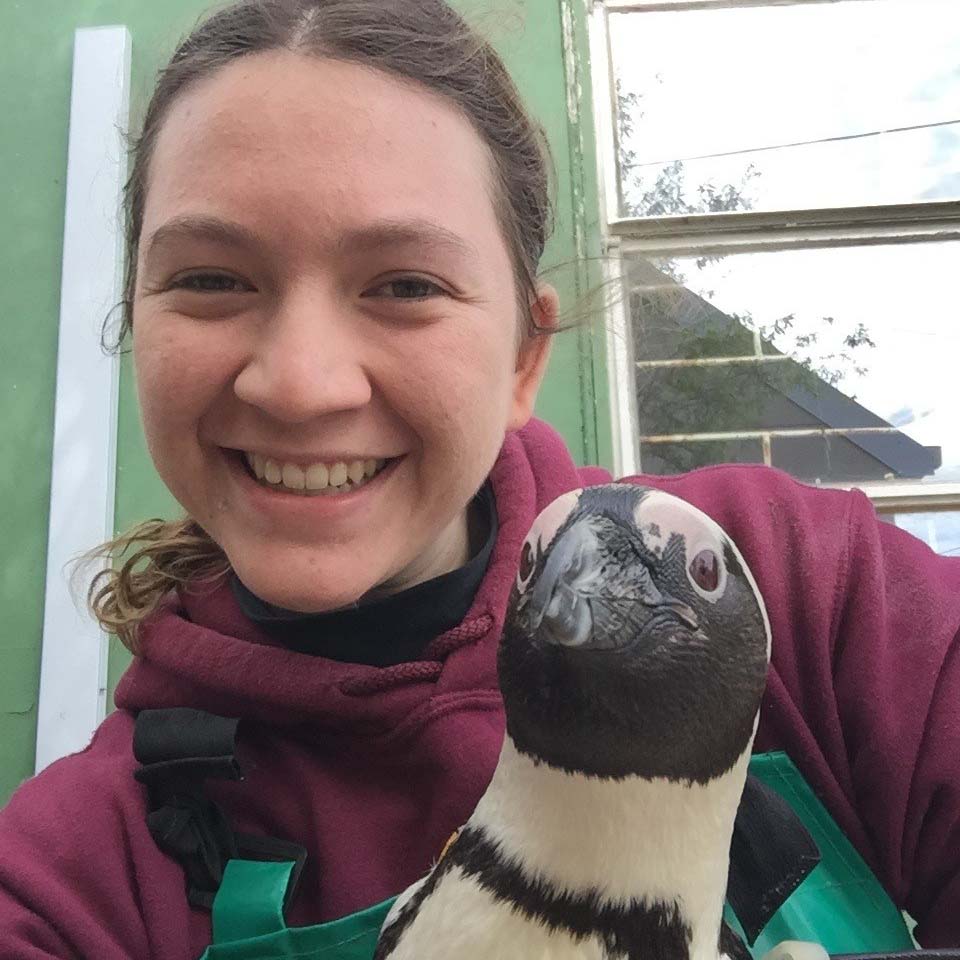Michelle, Class of 2023
 When did you decide to pursue veterinary medicine?
When did you decide to pursue veterinary medicine?
The day I got to do my first penguin necropsy. Unlike many of my peers who used to play dress up veterinarian with their friends, I didn’t decide to pursue veterinary medicine until I was a sophomore in college. I had always loved animals growing up, and thought I might have a career working with them, but at that point in time, I was more interested in training animals or studying their behavior, rather than working with them medically. However, the summer after my first year of college, I had the incredible opportunity to work at SANCCOB, the Southern African Foundation for the Conservation of Coastal Birds in Cape Town, South Africa. There, I assisted the rehabilitation staff and veterinary department to help rescue, rehabilitate, and release African penguins. From shark bites to premature births to neurologic cases, I was fascinated by the wide range of puzzling cases that faced the veterinarian. It was the constant questioning and discovery that enticed me to learn more. After watching a number of surgeries, completing a few necropsies, and even getting to do some field research with the veterinary team, I was hooked. From that moment on, I would combine my interest in animal training and behavior and apply it to a future career in veterinary medicine.
What did you do to prepare for veterinary school?
My preparation for veterinary school consisted of three main areas~ taking required classes; getting experience with a wide range of species; and pursuing research. The courses were pretty standard – I took what the schools were requiring. However, I always tried to supplement my required courses with other non-biology courses such as writing or history to keep myself balanced and using all sides of my brain every semester. Even today, I appreciate all of those “other” classes I decided to take because you never know when that material will pop up and be useful. With respect to experience, I was certainly not your average applicant. When I applied to vet school, I had over 1,000 hours working with dolphins and sea lions, maybe 100 hours working with dogs and cats, and no farm animal experience. I certainly didn’t have the traditional preparation, but I don’t intend to have a traditional career. I worked with the species I care about and hope to treat one day. I truly feel that working with those species prepared me for vet school, even if I didn’t come in with the small animal technical skills many of my peers did, because those experiences gave me the motivation and reaffirmed my decision to pursue this career path. As for research, I studied the social behavior of bottlenose dolphins. Having completed the research process prior to vet school—from hypothesis to data collection to analysis to manuscript writing—was one of the biggest things I could have done to prepare myself. Since I want to specialize in exotic medicine, I know that research will be a big part of my career. Having already gone through this process at least once prior to enrolling gave me the confidence and experience to join a lab at school and pursue projects in areas I am interested in.
What advice do you have for high school or college students who are interested in becoming a veterinarian?
My biggest piece of advice for pre-vet students is to give yourself the space and time to confirm that you truly want to attend veterinary school. It is a highly rewarding field, but it can also be difficult and taxing at times. Find yourself a good mentor that you can learn from and ask questions of. Building those connections, even early on, is key to success. Volunteer at a practice, do an internship, or become a technician. Even the simple tasks of cleaning kennels or preparing fish can go a long way in confirming that you want to pursue veterinary medicine. Nothing is too simple. Any experience you can get prior to entering will be important and helpful. And if possible, try to explore different areas of the field. Even if you know you want to be a small animal practitioner, you might surprise yourself that you actually also love the cows. As for some more practical advice, buy yourself a tablet. You’ll thank me later.
Why did you choose Cornell and what do you enjoy most about the veterinary program?
I intend to pursue a career in aquatic and zoological medicine. When I was thinking about schools, I spoke with the zoological medicine department at every single school I was considering about their program. I wanted to go to the school that had the best opportunities to set me on the best path. When I talked with professors such as Dr. Abu Madi and Dr. Getchell, I realized Cornell had exactly what I was looking for. There are so many opportunities available to students if you know where to look. I’m able to work as a student technician at the Janet Swanson Wildlife Clinic where as early as my first year I was able to be hands-on treating injured NY wildlife. I have taken classes such as the “Anatomy and Histology of Fish,” “Conservation Medicine,” “Fish Health Management,” and “Comparative Anatomy.” I have worked with Dr. Getchell on research projects and even created my own course over winter breaking studying aquaculture. I also got to participate in AQUAVET®, which is hosted by Cornell every summer and will be doing rotations at the Syracuse Zoo, the exotic ward in the hospital, and at the Wildlife Clinic during my 4th year. While the traditional curriculum does not include much for exotic medicine, I have been pleasantly surprised by the opportunities available to me at Cornell.


